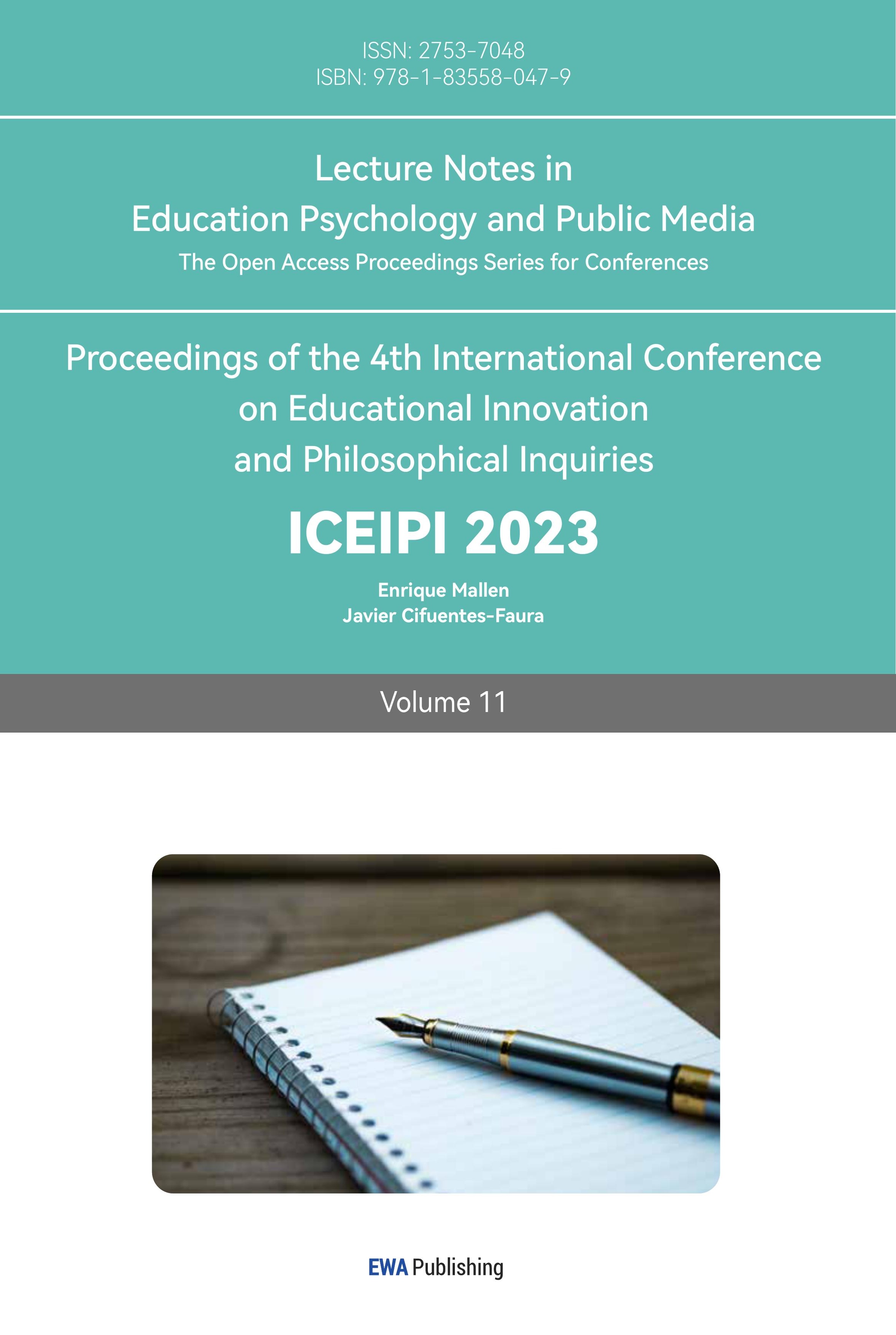References
[1]. Liang Q. (2020). The application of VR mental health education game under the perspective of embodied cognition. Office Automation (22), p 4.
[2]. Ling F, Meng F. (2022). Dialectical behavioral therapy interventions for borderline personality disorder from an embodied cognitive perspective: An application of VR-based technology. Language and Image Processing, (6). 91-99.
[3]. Wang J. (2021). Design and implementation of virtual reality games based on unity3d - taking the project of vr zoo as an example. Modern information technology, 5(10), 5.
[4]. Bai X., Zhao S. Long spear. (2021). Design and implementation of “pyramid” vr game based on unity3d. Electronic Design Engineering, p 5.
[5]. Zhou Y. (2017). Virtual reality game design and production based on unity 3d. Electronic World (7), 1.
[6]. Xu Y. (2021). Research on the design of science games based on virtual reality. Electronic World (12), 17.
[7]. Lin R., Xiao W. (2021). A study on the advantages of the application of vr educational games in education teaching. International Education Forum, 3(2), pp.96-98.
[8]. Shen Y. (2018). The application of virtual reality technology in game teaching. Office Automation (242), p74.
[9]. Jin G. S. Nakayama. 2014. Virtual reality game for safety education. 2014 International Conference on Audio. Language and Image Processing. pp. 95-100.
[10]. Mohammed Alfadil. (2020). Effectiveness of virtual reality game in foreign language vocabulary acquisition. Computers Education. 153.
[11]. Hvass J., O. Larsen, K. Vendelbo, N. Nilsson, R. Nordahl and S. Serafin. 2017. Visual realism and presence in a virtual reality game. 2017 3DTV Conference: The True Vision - Capture, Transmission and Display of 3D Video. pp. 1-4.
[12]. Li C. (2017). Embodied cognition and gamified learning: return and innovation in adult training. Adult Education, 37(6), p.5.
Cite this article
Kong,Z. (2023). An Educational Virtual Reality Game from an Embodied Cognitive Perspective -Take the Game “Poetry” as an Example. Lecture Notes in Education Psychology and Public Media,11,102-110.
Data availability
The datasets used and/or analyzed during the current study will be available from the authors upon reasonable request.
Disclaimer/Publisher's Note
The statements, opinions and data contained in all publications are solely those of the individual author(s) and contributor(s) and not of EWA Publishing and/or the editor(s). EWA Publishing and/or the editor(s) disclaim responsibility for any injury to people or property resulting from any ideas, methods, instructions or products referred to in the content.
About volume
Volume title: Proceedings of the 4th International Conference on Educational Innovation and Philosophical Inquiries
© 2024 by the author(s). Licensee EWA Publishing, Oxford, UK. This article is an open access article distributed under the terms and
conditions of the Creative Commons Attribution (CC BY) license. Authors who
publish this series agree to the following terms:
1. Authors retain copyright and grant the series right of first publication with the work simultaneously licensed under a Creative Commons
Attribution License that allows others to share the work with an acknowledgment of the work's authorship and initial publication in this
series.
2. Authors are able to enter into separate, additional contractual arrangements for the non-exclusive distribution of the series's published
version of the work (e.g., post it to an institutional repository or publish it in a book), with an acknowledgment of its initial
publication in this series.
3. Authors are permitted and encouraged to post their work online (e.g., in institutional repositories or on their website) prior to and
during the submission process, as it can lead to productive exchanges, as well as earlier and greater citation of published work (See
Open access policy for details).
References
[1]. Liang Q. (2020). The application of VR mental health education game under the perspective of embodied cognition. Office Automation (22), p 4.
[2]. Ling F, Meng F. (2022). Dialectical behavioral therapy interventions for borderline personality disorder from an embodied cognitive perspective: An application of VR-based technology. Language and Image Processing, (6). 91-99.
[3]. Wang J. (2021). Design and implementation of virtual reality games based on unity3d - taking the project of vr zoo as an example. Modern information technology, 5(10), 5.
[4]. Bai X., Zhao S. Long spear. (2021). Design and implementation of “pyramid” vr game based on unity3d. Electronic Design Engineering, p 5.
[5]. Zhou Y. (2017). Virtual reality game design and production based on unity 3d. Electronic World (7), 1.
[6]. Xu Y. (2021). Research on the design of science games based on virtual reality. Electronic World (12), 17.
[7]. Lin R., Xiao W. (2021). A study on the advantages of the application of vr educational games in education teaching. International Education Forum, 3(2), pp.96-98.
[8]. Shen Y. (2018). The application of virtual reality technology in game teaching. Office Automation (242), p74.
[9]. Jin G. S. Nakayama. 2014. Virtual reality game for safety education. 2014 International Conference on Audio. Language and Image Processing. pp. 95-100.
[10]. Mohammed Alfadil. (2020). Effectiveness of virtual reality game in foreign language vocabulary acquisition. Computers Education. 153.
[11]. Hvass J., O. Larsen, K. Vendelbo, N. Nilsson, R. Nordahl and S. Serafin. 2017. Visual realism and presence in a virtual reality game. 2017 3DTV Conference: The True Vision - Capture, Transmission and Display of 3D Video. pp. 1-4.
[12]. Li C. (2017). Embodied cognition and gamified learning: return and innovation in adult training. Adult Education, 37(6), p.5.









